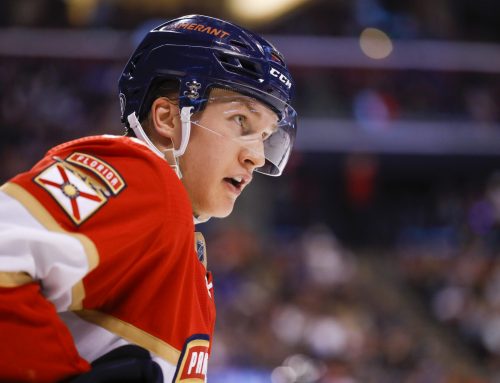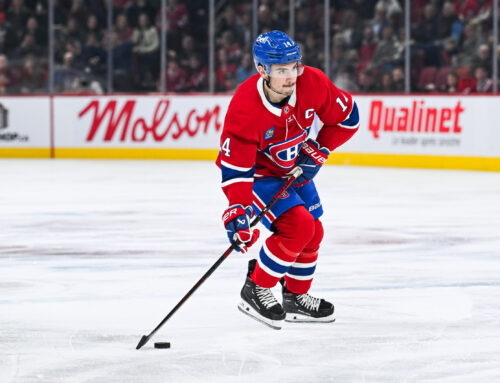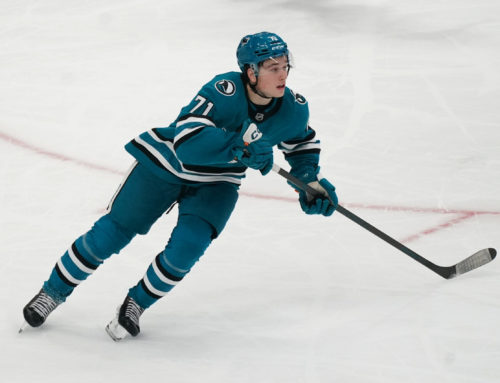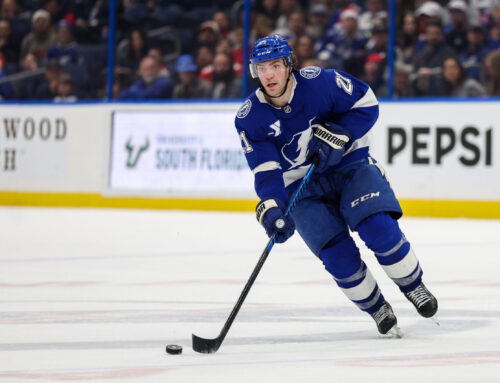
Great analysis here on which player is the better fantasy own – Alexander Wennberg or Sam Bennett?
We’re sticking with youngsters again – this time to cover Alexander Wennberg and Sam Bennett. The promising pivots had better 2015-16 seasons than would first appear, as although they combined for only 76 points in 146 games Wennberg finished with 39 in his final 56 contests and Bennett had 17 in a 22 game stretch during January and February. Who should poolies bank on for 2016-17 and beyond? Cage Match is here to find out!
Career Path and Contract Status
Wennberg was selected 13th overall in 2013 by Columbus, who, from this video, appeared to covet the Swedish prospect. Although Wennberg saw his scoring dip from 32 points in 48 games in 2012-13 to 21 in 50 games in 2013-14 while honing his craft in Sweden, he nevertheless found his way into 68 NHL games during 2014-15, finishing with only 20 points but managing 11 in his final 16 contests. And in 2015-16 Wennberg went beyond finishing strong, scoring at a 57 point pace for more than the final two-thirds of the season.
Bennett, despite famously failing to do a single pull-up at the 2014 combine, was selected 4th overall by Calgary in 2014 on the strength (pun intended) of his 91 points in 57 games in the OHL for 2013-14. Any debate as to whether Bennett would stay in the NHL for 2014-15 was mooted when he hurt his shoulder in training camp, requiring surgery. Once healthy he dominated in the OHL (24 points in 11 games) and appeared in one contest for the Flames, posting an assist. Last season he scored 36 points in 77 games; however, as noted above, he especially showed signs of emerging once the calendar flipped to 2016.
The 2016-17 campaign will be the last for both on their ELCs, which have identical $0.925M cap hits but quite different AAVs ($1.4M for Wennberg; $3.225 for Bennett).
Ice Time
|
Season |
Total Ice Time per game (rank among team’s forwards) |
PP Ice Time per game (rank among team’s forwards) |
SH Ice Time per game (rank among team’s forwards) |
|
2015-16 |
15:51 (A.W.) – 8th 15:08 (S.B.) – 7th |
2:10 (A.W.) – 5th 1:57 (S.B.) – 5th |
0:42 (A.W.) – 6th 0:01 (S.B.) – 14th (tied) |
|
2014-15 |
15:37 (A.W.) – 9th |
1:26 (A.W.) – 8th |
1:47 (A.W.) – 6th |
Wennberg’s lack of year-to-year improvement in Total Ice Time isn’t concerning. Why? He still found a way to improve his scoring, which actually isn’t too surprising in that despite a virtually unchanged Total Ice Time he had a 50% gain in PP Time while also shedding over 60% of his SH Time.
We also have to remember that 2015-16 was a tale of two seasons for Columbus –38 games before the Ryan Johansen trade (Wennberg played 29) and 44 games thereafter (Wennberg played 40). Pre-trade, Wennberg had 14 points, with eight contests in which his Total Ice Time was 17:00+ but nine in which it was below 13:00. But post-trade, he amassed 26 points without receiving less than 14:00 in any contest and 19 times skating for 17:00+. Therefore, Wennberg enters 2016-17 with promising Ice Time and production trends.
As for Bennett, nothing jumps out in an especially good or bad way, although it’s certainly encouraging that he received a regular PP shift and essentially no SH Ice Time. One thing to keep in mind though – as a rookie, Bennett was often shifted to wing, similar to what other teams have done with very young, top draft picks who are natural pivots. Bennett, who has somehow remained center-only on Yahoo, might not move back to center fulltime until after Mikael Backlund’s likely exodus as a UFA in 2018.
But even assuming Bennett indeed moves back to his natural center position for good, the question remains whether he has a realistic path to see his Ice Time substantially improve. After all, Sean Monahan, who just signed a seven year $44.62M extension and has displayed excellent chemistry with phenom Johnny Gaudreau, seemingly has the #1 pivot role locked up.
This is where differences between Wennberg and Bennett emerge, since unlike Bennett Wennberg has arguably no impediment to becoming his team’s #1 center. Sure – Brandon Dubinsky will continue to play a key role; however, Dubinsky checks boxes (e.g., playing physical, killing penalties) that the team thus won’t need Wennberg to check. As a result, Wennberg should not only continue to get additional Ice Time, but also have that Ice Time come in the form of desirable deployments at even strength and the PP. In contrast, if Bennett reassumes his natural center role, it will likely be as a #2 or, at best, #1A, complete with more responsibility and “heavy lifting” (again, pun intended). The silver lining is such a role can still result in a successful fantasy career – just ask the likes of Evgeni Malkin and David Krejci.
Secondary Categories
|
Season |
PIMs (per game) |
Hits (per game) |
Blocked Shots (per game) |
Shots (per game) |
PP Points (per game) |
FOW (per game) |
|
0.03 (A.W.) 0.48 (S.B.) |
0.46 (A.W.) 1.43 (S.B.) |
0.66 (A.W.) 0.41 (S.B.) |
1.40 (A.W.) 1.76 (S.B.) |
0.17 (A.W.) 0.10 (S.B.) |
5.79 (A.W.) 2.07 (S.B.) |
|
|
2014-15
📢 advertisement:
|
0.32 (A.W.) |
0.85 (A.W.) |
0.66 (A.W.) |
1.25 (A.W.) |
0.06 (A.W.) |
4.23 (A.W.) |
Bennett’s numbers are strong (Hits) or decent (SOG, Blocked Shots, PIM) across the board for a rookie, other than FOW (tied to him playing wing and likely to improve down the road) and PPPts. In terms of the latter, Bennett’s best hope is to somehow find himself on PP1, either by displacing someone who’s already there or by Calgary deploying a super unit with four top forwards out there together.
But Bennett likely lacks the size to pull himself up (pun yet again intended) onto PP1 in place of newly signed Troy Brouwer, so displacing someone seems unlikely. A super unit of four forwards also seems like a longshot, since Calgary’s blueline talent includes both left-handed (Mark Giordano, T.J. Brodie) and right-handed (Dougie Hamilton) shooters signed through 2020. The best Bennett could hope for is the team tries to roll out two equally good PP units with top players on each, yet we know that usually isn’t how teams approach the PP these days. Accordingly, it seems unlikely Bennett will see his PPPt scoring improve, which in turn could act as a de facto short term points ceiling.
Wennberg saw his output improve in offense-affecting categories, but drop quite a bit in Hits and PIM. But he still offers one Hit+BS per game, which won’t be too bad if indeed he develops into a solid scorer. His PIM are another story, as you don’t get only two in 69 total games as a fluke. Need proof? Among current NHLers who had fewer than five PIM in a 60+ game season (Marcus Johansson, Ryan O’Reilly, Brandon Sutter, Matt Moulson), only one has exceeded 20 PIM in a season more than twice in their career thus far. So if your league counts PIM, devalue Wennberg accordingly.
Interestingly, Wennberg’s PPPts and SOG weren’t as positively affected by the Johansen trade as his Ice Time and production. In fact, Wennberg had four PPPts in 29 games pre-trade, and eight in 40 games thereafter, so his PPPt per game rate was higher post-trade but not substantially higher. Far more eye-opening is that Wennberg had 15 games (among 29) with 2+ SOG pre-trade, and only 16 games (among 40) with 2+ SOG thereafter. Some explanation might lie in Wennberg playing extra hard early on, in order to open eyes, which, after the trade, were wide open. Either way, it’s concerning for those in SOG or Goal-heavy pools, who might fear Wennberg settling into a “pass first” center mold.
That led me, as I often do, to try and find player comparables. But guess what – Wennberg literally has none! Not one NHL forward since 1990-91 tallied more than 55 points (Wennberg has 60) while potting fewer than 15 goals (Wennberg had 12) within their first 200 NHL shots (Wennbeg has 182). Hmmmm.
Luck-Based Metrics
|
Season |
Personal Shooting Percentage |
PDO/SPSV (5×5) |
IPP (5×5) |
IPP (5×4) |
Offensive Zone Starting % (5×5) |
|
2015-16 |
8.2% (A.W.) 13.2% (S.B.) |
1006 (A.W.) 985 (S.B.) |
63.9% (A.W.) 71.1% (S.B.) |
71.4% (A.W.) 66.7% (S.B.) |
54.2% (A.W.) 55.2% (S.B.) |
|
2014-15 |
4.7% (A.W.) |
959 (A.W.) |
57.1% (A.W.) |
33.3% (A.W.) |
47.0% (A.W.) |
Wennberg’s low personal shooting percentage is a surprise given his lack of goal scoring, since usually those who don’t score many goals nor take many shots are at least pretty accurate on the rarer occasions they decide to shoot the puck. The good news is by virtue of his shooting percentage, we can finally arrive upon a player comparable for Wennberg, as there’s one player since 1990-91 who also had a season by age 21 with fewer than 100 SOG and under an 8.5% personal shooting percentage while still managing to score 30+ points. And it was none other than Jonathan Drouin in 2014-15. Not a bad comparable for Wennberg owners to see.
Beyond that, Wennberg had excellent IPPs for a second year player in general, and specifically in view of what he posted as a rookie. Also, if anything he should see his OZ% continue to rise not only due to the more shutdown role played by Brandon Dubinsky but also once the Blue Jackets improve as a team.
Bennett IPPs are excellent for a first year player, especially since we can see from his OZ% that he wasn’t given sheltered minutes. Where concern possibly arises is in his 13.2% personal shooting percentage. I’ve said before that high personal shooting percentage goes hand-in-hand with goal scoring (and sure enough, 23 of 28 players who scored 30+ goals last season had one at least as high as Bennett’s 13.2); but here’s the thing – Bennett only had 18 goals in 77 games, or not even one per four games.
Guess what though – there are plenty of favorable player comparables for that type of stat line, as since 1990-91 there’ve been 21 other instances of a player age 21 or younger posting 35+ points in a season while averaging no more than one goal per four games and scoring on 13.0%+ of their SOG. Not only did nearly half score 70+ points in at least one NHL season (Saku Koivu, Sergei Samsonov, Todd Bertuzzi, Ales Tanguay, Henrik Sedin, Martin Rucinsky, Petr Nedved, Ray Whitney, Mikael Nylander), but also a handful are highly-regarded youngsters (Aleksander Barkov, Mika Zibanejad, Robby Fabbri, Anthony Duclair, and, as covered last week, Andrei Burakovsky), while only three were disappointments (Vitali Yachmenev, Andrew Cogliano, Josh Bailey).
Who Wins?
First and foremost, fantasy success requires talent; however, if one doesn’t receive an opportunity to fully showcase that talent, then fantasy success often ends up being delayed or, in some cases, might not ultimately be achieved. What this match boils down to is two unquestionably talented players, one of whom (Bennett) might arguably be more talented player on paper while the other (Wennberg) has a better near term opportunity to achieve fantasy success. With both center-only eligible, Wennberg wins this match.
So what happens next? I see Wennberg as a lock for 50 points this season, with an even money shot at 55+ and an outside chance at 60. Just how high his scoring ends up depends to a large degree on how the team around him performs. Down the road, however, Wennberg seemingly has the makings of a player with a ceiling probably closer to 70 points than 80.
Meanwhile, Bennett will suffer in the near term from his role and line placement, with perhaps an outside shot at 50 points this season but more likely 45-50. Once he takes over as the #2 (or #1A) center and additional talent is brought into the mix (can you say Matthew Tkachuk?), Bennett should be able to flirt with 60+ points. And down the road, even if Bennett isn’t traded he could form a very solid one-two punch with Monahan and be a viable candidate for 75+ points. Poolies should take action in leagues with these forecasts in mind.
4 Comments
Leave A Comment
You must be logged in to post a comment.





 PHI
PHI ANA
ANA VAN
VAN DET
DET BUF
BUF NYR
NYR MIN
MIN N.J
N.J

Hey Rick, I defer to your expertise, but I would respectfully submit to you that Bennett has a higher multi-category upside. Maybe it’s because I own him in my keeper league and (hoping) he breaks out this season. With Backlund out with a concussion, I suspect Bennett will receive a larger role and more ice time. Wennberg is less physical and on a struggling to rebuild team with a rather anemic supporting cast. Of course, this also depends on the categories for any given league. Plus, Bennett had a well balanced 18G’s and 18A’s showing he’s not a “one dimensional” player. The more categories, the bigger advantage to Bennett. Then again, I may be just “whistling in the graveyard” fearing that I have too much stock in Bennett. Your thoughts about my take? And, most of all, I ask…if you were down to your last keeper choice between Bennett and Wennberg…who stays?
You make very reasoned points, but the issue is Monahan and the roadblock he represents with respect to Bennett. As good as Bennett could be, unless he’s a true #1 center, which now it looks like he won’t be, he most likely won’t be able to get much past 70 points, and even that could be a challenge without a role on PP1. Wennberg likely doesn’t match Bennett’s raw talent, but he’s going to be given the opportunity and ice time to succeed.
As for who I’d choose in a keeper, if I was in the midst of a rebuild I’d definitely role the dice with Bennett. But if I was looking to win in 2-3 years I might opt for Wennberg. Also keep in mind that Wennberg’s cost, whether in terms of a draft pick or to obtain in trade, will be much higher than Wennberg, and that has to weigh into the equation.
little typo in that last sentence, Rick.
Presume you mean “Bennett’s cost higher than Wennberg”?
Nice analysis though.
rich
Thanks and yup – my mistake. The second “Wennberg” in the last sentence should be “Bennett.”